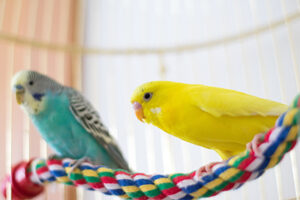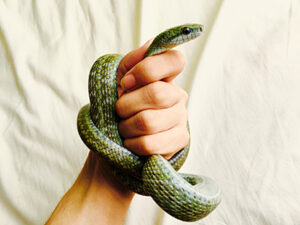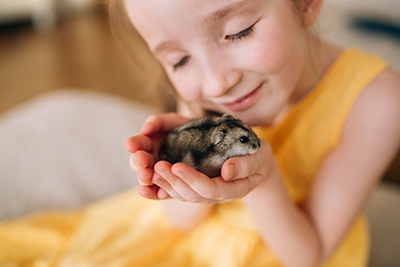The Most Popular Exotic Pets
I’ve always been fascinated by exotic pets. Cats and dogs have their place, but there’s something about living with an unusual animal that sounds interesting to me. I decided to do some preliminary research on exotic pets and which ones are the most commonly owned.
So, what are the top 10 owned exotic pets? These include lizards, birds, hamsters, gerbils, and rats, turtles, sugar gliders, ferrets, hedgehogs, chinchillas, arachnids, and snakes. Within these categories, there are a variety of species and breeds as well.
Exotic pets are still wild animals, so with each type of pet comes a variety of pros and cons.
1. Lizards
Lizards are very popular exotic pets. These critters usually make it onto the most commonly owned pet list. They’re not technically “exotic” animals but are considered exotic pets since they need to see a specialized vet for care.
One of the reasons lizards are popular pets is because they’re relatively easy to care for, as they do not need to be bathed, walked, or trained. These animals usually live in tanks and eat live or frozen insects.
Although lizards can make great pets, they can carry salmonella bacteria, and some have sharp teeth and claws which may result in scratches. Because of this, caution is advised when purchasing a pet lizard for a child.

2. Birds
Birds make great pets because they’re social animals and love attention. They’re also highly intelligent and easy to train, making them fun to watch and interact with. Some can even be taught to mimic a human voice.
Breeds of birds that are commonly found in homes include canaries, parakeets, cockatiels, lovebirds, parrots, and finches. They usually live in cages and eat seeds, fruits, or vegetables.
While they are worth the effort to many people, pet birds do require a lot of time, attention, and energy. Birds should never be left alone for long periods because being alone makes them feel stressed.
In addition, they can be loud, expensive, and have beaks that can scratch, which means they’re not usually a good fit for families with young children.
3. Hamsters, Gerbils, and Rats
Rodents make popular pets due to their cleanliness (they don’t smell, believe it or not) and having no real special care requirements. In addition, they can be kept in small cages, making them a great fit for those with smaller spaces, and are generally safe and fun to handle.
These animals are also highly intelligent, making them entertaining and trainable. They love to run, so they’ll need plenty of room in their cage for exercise, and it’s advised that owners get their animals exercise wheels, running tubes, or hamster balls.
It is important to note that hamsters and rats are both nocturnal (gerbils aren’t). This means they’ll prefer to do most of their running at night, which can often be loud.
4. Turtles and Tortoises
Many types of turtles make great pets because they are small and easy to care for. However, there are some important things to know before purchasing these animals as pets:
- Turtles can carry salmonella bacteria.
- Turtles also have sharp teeth that can damage young children’s fingers or scratch adults’ hands.
There are plenty of upsides to owning a turtle or tortoise, however, such as their long lifespans and relative ease of care.
Many species do not need much space or special lighting, and in general are mostly aquatic, eat vegetables, and live in a tank. They and their tanks do need to be cleaned frequently, so be aware of that.
5. Sugar Gliders
Sugar gliders are small, nocturnal marsupials that have a pouch on their stomachs in which they carry their young. They tend to be cute and cuddly and can become attached to one person very quickly.
However, sugar gliders can bite if provoked and have sharp claws which will cause injury if not handled carefully. Because of this, sugar gliders are usually best for adults or responsible older children.
Sugar gliders eat small insects, fruit, and vegetables. They are nocturnal creatures which means they’re awake during the night to play, eat, run, and glide around.
They also need a larger space with hanging branches for their nightly activities, and they should be regularly let out of their cages for supervised exercise.

6. Ferrets
Ferrets may look intimidating at first glance, but they make great pets because of their small size and energetic personalities. Many people shy away from these animals because they’re commonly thought to have a foul odor, but this can often be avoided by spaying or neutering them.
Ferrets can be used to kill and eat mice in the home, but they are also great for children that want a cuddly pet. They are naturally playful, friendly animals that can be handled regularly.
Ferrets have a lot of energy, so they need cages with plenty of space to run around and an exercise wheel, if possible.
7. Hedgehogs
Hedgehogs are not only adorable, but they are also great for people who want an unusual pet. Even though they may look like porcupines, their quills are softer than a porcupine’s, making them a much more ideal pet.
Hedgehogs are nocturnal, quiet, and insectivorous, making them a low-maintenance pet. They do need a generous amount of space in their cages because they also like to climb, which is part of what makes them such entertaining pets.
As cute as they are, however, hedgehogs can be irritable at times and need help keeping up with their hygienic needs, which means children aren’t always the best caretakers for hedgehogs.
8. Chinchillas
Chinchillas can be great pets due to their small size, but they also require a special diet, dust baths, and exercise. However, many pet owners find that a chinchilla’s cute appearance and friendly personality outweigh the special considerations they need.
Chinchillas are very clean, so their cages only need to be cleaned out about once a month. They eat hay, pellets, fruits, vegetables, and occasionally seeds.
They are nocturnal animals which means they sleep during the day but love to run around at night; however, because of their small size, they should be kept in a playpen or secure area when unattended.
9. Arachnids
Arachnids include spiders and scorpions. While many of these types of animals can be harmful to humans, that doesn’t mean there aren’t some that can make great pets.
Tarantulas are usually the most popular type of pet spider because they’re large, docile, and can even be affectionate. They only bite when badly provoked with no escape route and can be regularly handled.
Scorpions aren’t usually as good at being handled as tarantulas are, but they’re fascinating animals that are quiet and easy to care for, making them attractive pets for many.
Arachnids need to eat live insects, which poses a unique set of challenges, so they are not necessarily always suitable pets for young children or beginning pet owners.
10. Snakes
Snakes are popular pets because of their interesting appearance and the fact that they require little maintenance. The most common types of pet snakes are ball pythons and corn snakes.
Snakes can be very gentle if they are socialized early, but even gentle snakes have teeth, so it’s important to take precautions when handling them.
Most snakes eat live mice or fish, which can be messy, but some snakes will eat pre-killed food.
Snakes can live for a long time depending on the species, so it is important to look into the different requirements of each type before purchasing one as a pet.
Some people argue that even though these are common exotic pets, they are not good for children because of the potential dangers involved with these animals, especially if the child is going to be handling them alone.
How To Choose the Right Exotic Pet for You
Choosing an exotic pet can be exciting, but there are some things you should consider when thinking about which animal is right for you.
Where You Live
One of the first aspects of exotic pet ownership is to think about where you live. Different types of exotic animals require different types of living conditions.
It can be difficult to provide a tropical environment to an animal if you live in a dry, cold climate, for instance. In addition, some exotic pets require large enclosures, so consider whether or not you’ll have room for that in your home.

What The Pet Eats
The second element to consider when you’re choosing an exotic pet is what it eats. Many of these animals have specific and complicated dietary needs, so make sure you know you have the finances, energy, and time to fulfill these needs before you adopt one.
What Personality You Prefer
After you’ve given some thought to both of these aspects of exotic pet ownership, consider what personality you’d like your exotic pet to have. For example, some people prefer to have more interactive pets that they can touch and play with, while others just want something quiet and entertaining to look at.
So, if being able to interact with an animal is important to you, be sure to choose one that has a personality that will meet those expectations.
Whether The Pet is Legal
Last but not least, research whether or not the exotic pet you’re interested in is legal in your area. Different states have different laws regarding exotic animals, so you’ll need to find out whether or not the animals that interest you are allowed where you live.
Some states also require you to apply for a permit to own an exotic pet, and many have requirements for animal vaccinations and enclosures.
Related Questions
Where do you buy an exotic pet? Many pet stores and local businesses carry a variety of animals, including some exotic pets. However, since you’ll have to do a lot of research before adopting an exotic pet, you might want to shop around at several stores to make sure you get all of your questions answered and that you’re well prepared.
Where do you bring an exotic pet for medical care? When you adopt an exotic pet, it is important to find a veterinarian who has experience with exotic animals. Some veterinarians will be more familiar with some types of exotic pets than others, so ask around for recommendations on which local veterinarians are best with your particular exotic pet. If a veterinarian isn’t confident with a certain type of animal, they may be able to recommend someone else who is.

